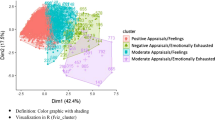Abstract
Professional development as advocated in the Baydus/Toscano model, primarily conceived as anintra personal emotional maturing process constitutes a rather limited and one-sided perspective. Professional development, especially in child care work, is primarily anchored in the interactional events. The child care worker struggles with complex tasks in a relatively powerless position in order to become a group leader which his or her role demands. Even if professional development is an individual process, the actual chances for development are anchored in the clarity of a person's role expectaions and the available resources and freedom to carry out the necessary tasks associated with the role. The support obtained is not a personal but rather a system issue—namely the degree of actual recognition given within the context of the total staff alignments. Support, in its clearest analysis, is reflected basically through working conditions, receptivity to staff persons' input within their role functions, status, and salary classifications. How dollars for child care work are spent means what kind of support is at hand.
Similar content being viewed by others
References
Bettelheim, B. Staff. InA home for the heart, New York: Alfred A. Knopf, 1976, 267–454.
Bettelheim, B. & Wright, B. Staff development in a treatment insitution.American Journal of Orthopsychiatry 1955,85 705–719.
Birnbaum, D. Some observations on the dilemmas and pressures of the child care job.Child Care Quarterly 1973,2 87–97.
Maier, H.W. Learning to learn, living to live.Child Welfare 1975,54(6), 406–420.
Maier, H. W. The child care worker. In J. Turner (Ed.),Encyclopedia of social work, 1977. New York: National Association of Social Workers, 1977, 130–134.
Polsky, H. W.Cottage Six. New York: Russell Sage, 1962.
Polsky, H. W. & Claster, D. S.The dynamics of residential treatment. Chapel Hill, N.C.: University of North Carolina Press, 1968.
Portnoy, Sanford M., Biller, H. B. & Davids, A. The Influence of the child care worker in residential treatment.American Journal of Orthopsychiatry, 1972, 42, 719–722.
Author information
Authors and Affiliations
Additional information
This is a companion article to an original position paper by Gregory Bayduss and John A. Tuscano, “Child Care Workers Development.”
Rights and permissions
About this article
Cite this article
Maier, H.W. Child care workers' development within an interactional perspective: A response to Bayduss and Toscano. Child Youth Care Forum 8, 94–99 (1979). https://doi.org/10.1007/BF01554710
Issue Date:
DOI: https://doi.org/10.1007/BF01554710




